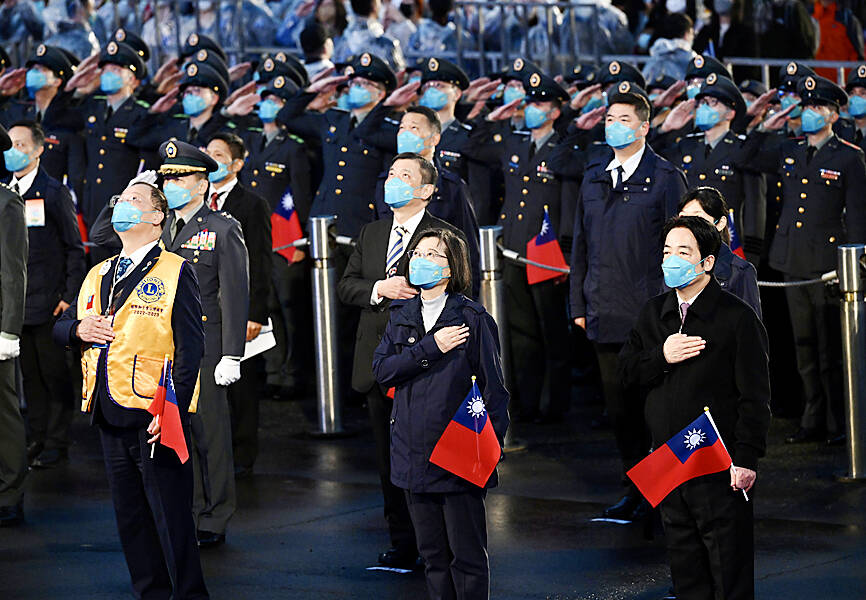Surplus national tax revenue is to be used to close financing gaps in the Labor Insurance and National Health Insurance funds, subsidize electricity prices and fund a series of initiatives to help weather potential dramatic changes in global economy this year, President Tsai Ing-wen (蔡英文) said in her New Year address at the Presidential Office in Taipei yesterday.
“We will consider sharing excess tax revenue with all citizens only when it is within our fiscal capacity to do so,” Tsai said.
Lawmakers from the Democratic Progressive Party and Chinese Nationalist Party (KMT) have urged the government to return the surplus tax revenue to the public.

Photo courtesy of the Association of Taipei Photojournalists
“I understand that some have proposed that excess tax revenue be equally shared among our people, which would surely make everybody happy,” Tsai said.
“However, as a responsible government, we need to plan ahead when the global economy is fraught with a high level of uncertainty,” she said. “We should prioritize the distribution of valuable resources to individuals and industries at risk to maintain the resilience of the country in times of crisis.”
“This is not an easy decision, but we must do it for our country. We hope that people understand and support this decision,” she added.
The Ministry of Finance estimated that last year’s national tax revenue is expected to exceed the budget by NT$450 billion (US$14.65 million), of which NT$70 billion is to be used to fund the operations of local governments, Tsai said.
Of the remaining NT$380 billion in tax revenue, NT$100 billion is to be allocated to electricity price subsidies and closing the funding gap in the Labor Insurance and National Health Insurance funds, she said.
Another NT$100 billion is to be used to fund government initiatives to withstand potential global economic changes this year, she said.
The initiatives include increasing the housing supply and offering subsidies for renters and those who are on home loans; subsidizing public transport commuters; subsidizing families who are in the middle and low-income range; reinforcing agricultural and fishery infrastructure; attracting 6 million international tourists this year; sustaining stable prices of food and daily necessities; and helping upgrade small and medium-sized industries nationwide, she said, citing decisions made at a National Security Council meeting on Saturday.
Whether this means the government is unlikely to distribute cash or vouchers using the remaining surplus tax revenue as it did in 2020 and last year, Tsai said that closing the financing gap of the Labor Insurance Fund and maintaining stable retail prices are also ways to return tax revenue to the public.
The global economy is likely to be worse than expected this year, and there remains a high level of uncertainty, she said.
“The rest of the tax revenue — NT$180 billion — could enable us to fund subsequent economic stimulus plans. We need to use the money cautiously in case emergency situations occur,” she said.
Tsai said the Presidential Office and the Executive Yuan are together consulting the private sector on the development of six core strategic industries: national defense, war readiness, precision healthcare, renewable energy, cybersecurity, and semiconductor and information technology.
Stability of the Indo-Pacific region is also threatened, she said.
A plan she introduced last week to bolster national defense would enhance Taiwan’s defense through a comprehensive adjustment of the defense systems and by raising the quality and quantity of military training for conscripts, she said.

An essay competition jointly organized by a local writing society and a publisher affiliated with the Chinese Communist Party (CCP) might have contravened the Act Governing Relations Between the People of the Taiwan Area and the Mainland Area (臺灣地區與大陸地區人民關係條例), the Mainland Affairs Council (MAC) said on Thursday. “In this case, the partner organization is clearly an agency under the CCP’s Fujian Provincial Committee,” MAC Deputy Minister and spokesperson Liang Wen-chieh (梁文傑) said at a news briefing in Taipei. “It also involves bringing Taiwanese students to China with all-expenses-paid arrangements to attend award ceremonies and camps,” Liang said. Those two “characteristics” are typically sufficient

The brilliant blue waters, thick foliage and bucolic atmosphere on this seemingly idyllic archipelago deep in the Pacific Ocean belie the key role it now plays in a titanic geopolitical struggle. Palau is again on the front line as China, and the US and its allies prepare their forces in an intensifying contest for control over the Asia-Pacific region. The democratic nation of just 17,000 people hosts US-controlled airstrips and soon-to-be-completed radar installations that the US military describes as “critical” to monitoring vast swathes of water and airspace. It is also a key piece of the second island chain, a string of

A magnitude 5.9 earthquake that struck about 33km off the coast of Hualien City was the "main shock" in a series of quakes in the area, with aftershocks expected over the next three days, the Central Weather Administration (CWA) said yesterday. Prior to the magnitude 5.9 quake shaking most of Taiwan at 6:53pm yesterday, six other earthquakes stronger than a magnitude of 4, starting with a magnitude 5.5 quake at 6:09pm, occurred in the area. CWA Seismological Center Director Wu Chien-fu (吳健富) confirmed that the quakes were all part of the same series and that the magnitude 5.5 temblor was

The Central Weather Administration has issued a heat alert for southeastern Taiwan, warning of temperatures as high as 36°C today, while alerting some coastal areas of strong winds later in the day. Kaohsiung’s Neimen District (內門) and Pingtung County’s Neipu Township (內埔) are under an orange heat alert, which warns of temperatures as high as 36°C for three consecutive days, the CWA said, citing southwest winds. The heat would also extend to Tainan’s Nansi (楠西) and Yujing (玉井) districts, as well as Pingtung’s Gaoshu (高樹), Yanpu (鹽埔) and Majia (瑪家) townships, it said, forecasting highs of up to 36°C in those areas